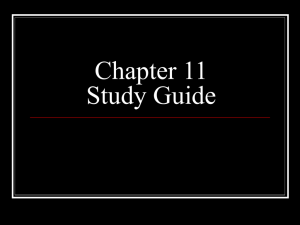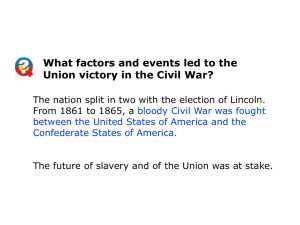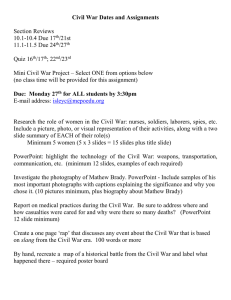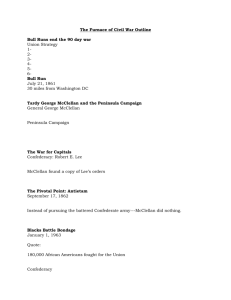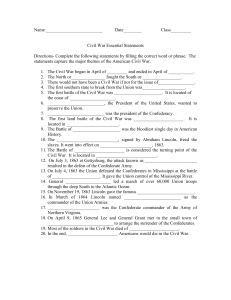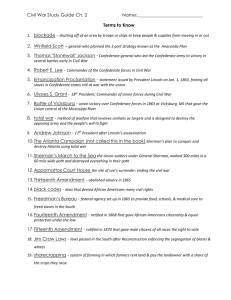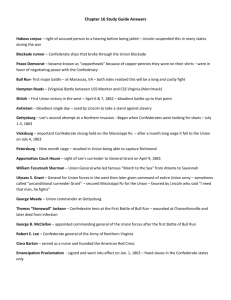Civil War Timeline - Chronological Order Lincoln calls for 75,000
advertisement
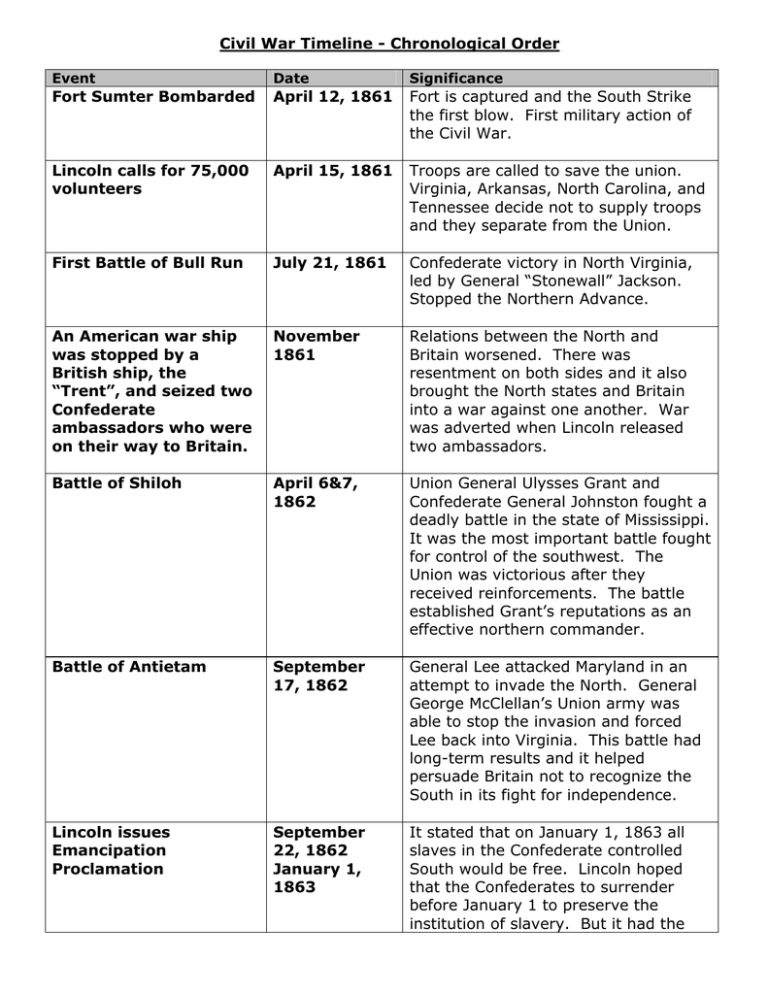
Civil War Timeline - Chronological Order Event Date Significance Fort Sumter Bombarded April 12, 1861 Fort is captured and the South Strike the first blow. First military action of the Civil War. Lincoln calls for 75,000 volunteers April 15, 1861 Troops are called to save the union. Virginia, Arkansas, North Carolina, and Tennessee decide not to supply troops and they separate from the Union. First Battle of Bull Run July 21, 1861 Confederate victory in North Virginia, led by General “Stonewall” Jackson. Stopped the Northern Advance. An American war ship was stopped by a British ship, the “Trent”, and seized two Confederate ambassadors who were on their way to Britain. November 1861 Relations between the North and Britain worsened. There was resentment on both sides and it also brought the North states and Britain into a war against one another. War was adverted when Lincoln released two ambassadors. Battle of Shiloh April 6&7, 1862 Union General Ulysses Grant and Confederate General Johnston fought a deadly battle in the state of Mississippi. It was the most important battle fought for control of the southwest. The Union was victorious after they received reinforcements. The battle established Grant’s reputations as an effective northern commander. Battle of Antietam September 17, 1862 General Lee attacked Maryland in an attempt to invade the North. General George McClellan’s Union army was able to stop the invasion and forced Lee back into Virginia. This battle had long-term results and it helped persuade Britain not to recognize the South in its fight for independence. Lincoln issues Emancipation Proclamation September 22, 1862 January 1, 1863 It stated that on January 1, 1863 all slaves in the Confederate controlled South would be free. Lincoln hoped that the Confederates to surrender before January 1 to preserve the institution of slavery. But it had the opposite effect. Southerners looked upon the Proclamation as a final statement that the North was going to abolish slavery if it won the war. It made some Southerners more determined to fight. In reality the Proclamation did not free a single slave since slavery was still legal in the border states and in areas of the South, occupied by Union forces. But the Civil War had now become a war to save the Union and to free the slaves. Emancipation Proclamation increased support for the North in Britain and in France. Also thousands of Blacks volunteered to join the Union Army after the announcement of the Proclamation. Chancellorsville May 3&4, 1863 General Lee won a victory for the South at the Battle of Chancellorsville in North Virginia. But then another popular military leader was lost by the South when “Stonewall” Jackson was mistakenly killed by Confederate troops. Battle of Gettysburg July 1-3, 1863 Robert E. Lee thought it was essential to attack the North and capture enemy supplies. He hoped this bold move would change the direction of the war. Between July 1-3 Lee’s Confederate Army fought the decisive Battle of Gettysburg, in southern Pennsylvania. For three days Confederate troops battled Union troops under General George Meade. Lee’s artillery and troops kept bombarding and attacking the Union position who refused to give up their position. On July 3, General Pickett led 15,000 Confederates across open fields and charged the Union lines. Union artillery and troops mowed down the charging troops and only about 100 soldiers reached the Union positions. The failure of “Pickett’s Charge” meant that Lee was defeated. Many historians believe that this was the turning point of the war. Lee escaped with his remaining troops to Virginia. The North won another battle at Vicksburg when General Grant captured the Confederate city of Vicksburg. The starving city of Vicksburg and 30,000 Confederate troops had to surrender to grant after a two month siege. This battle is significant since it cut the South in two and Arkansas, Louisiana, and Texas could not help the other Confederate States. It also meant that the entire Mississippi River was under the control of the Union troops. The South would now have major problems with transportation. Battle of Vicksburg July 4, 1863 Gettysburg Address November 1863 For several months after the battle of Gettysburg thousands of decaying bodies lay on the battlefields. Pressure mounted to bury the dead and create a national cemetery to honour those who had died. Lincoln gave his famous Gettysburg Address at the cemetery to honour the thousands of Americans who had died fighting each other. St. Alban’s Raid 1864 Increased tensions between Britain and the Northern States since Confederates living in Canada conducted a raid on St. Alban’s Vermont. They robbed three banks and stole $200,000. They wanted the North to declare war on Canada but this did not occur. Atlanta captured by Union Troops September 2, 1864 Union General William Sherman invaded and captured Atlanta. Everything in the path of the Union army was confiscated or destroyed. The city of Atlanta was set on fire and much of the city was destroyed. Nothing was left to help the enemy continue its fights. Savannah surrenders December 21, 1864 Sherman’s troops marched to Savannah and created a 100km path of total destruction. Plantations were looted and burned and all livestock, grain, and food was taken or destroyed. Savannah surrendered to General Sherman and the South was mortally wounded and could not fight much longer. Richmond Falls April 3, 1865 Richmond was the Confederate’s capital and the confederates fought desperately to save their capital. The Union General Grant lead 100,000 troops into Richmond and had 60,000 Union casualties in less than a month. Finally on April 3, 1865 Lee’s Confederate army was worn out and surrendered. Lee surrenders at a town called Appomattox Courthouse April 9, 1865 Ulysses S. Grant and Robert E. Lee met to discuss the peace terms. Lincoln had told Grant to offer generous peace terms to their fellow Americans. Confederate troops had to take an oath of loyalty to the U.S.A. Confederate soldiers had to surrender their weapons. The terms of surrender were generous because Lincoln wanted to lessen the angry feelings of Southerners. He did not want revenge and wanted to avoid any additional humiliation. He wanted southerners to reunite with their fellow-Americans and work together to make the country strong once more. Lincoln is Assassinated April 14, 1865 President Lincoln was shot while watching a play at Ford Theatre in Washington, DC. He was shot by prosouthern actor John Wilkes Booth. Both was a member of an extremist group that planned to kill a number of northern leaders in revenge for the South’s defeat. Lincoln’s death shook the country. He became the greatest martyr who gave his life for the northern cause in the Civil War. Hundred of thousands of Americans gathered along the route of his funeral train as it carried his body back to Springfield, Illinois. Some southerners were happy to see Lincoln shot since they were taught to hate Lincoln as the enemy. Andrew Johnson was sworn in as the 17th president on April 15, 1865. Jefferson Davis is captured May 10, 1865 Jefferson Davis the leader of the Confederate states of America is finally captured, disguised as a women. He was imprisoned for two years and was often confined in chains. This angered many southerners. The Civil War was over but the hate and the bitterness of defeat remained with many southerners as they attempted to rebuild the devastated South.
